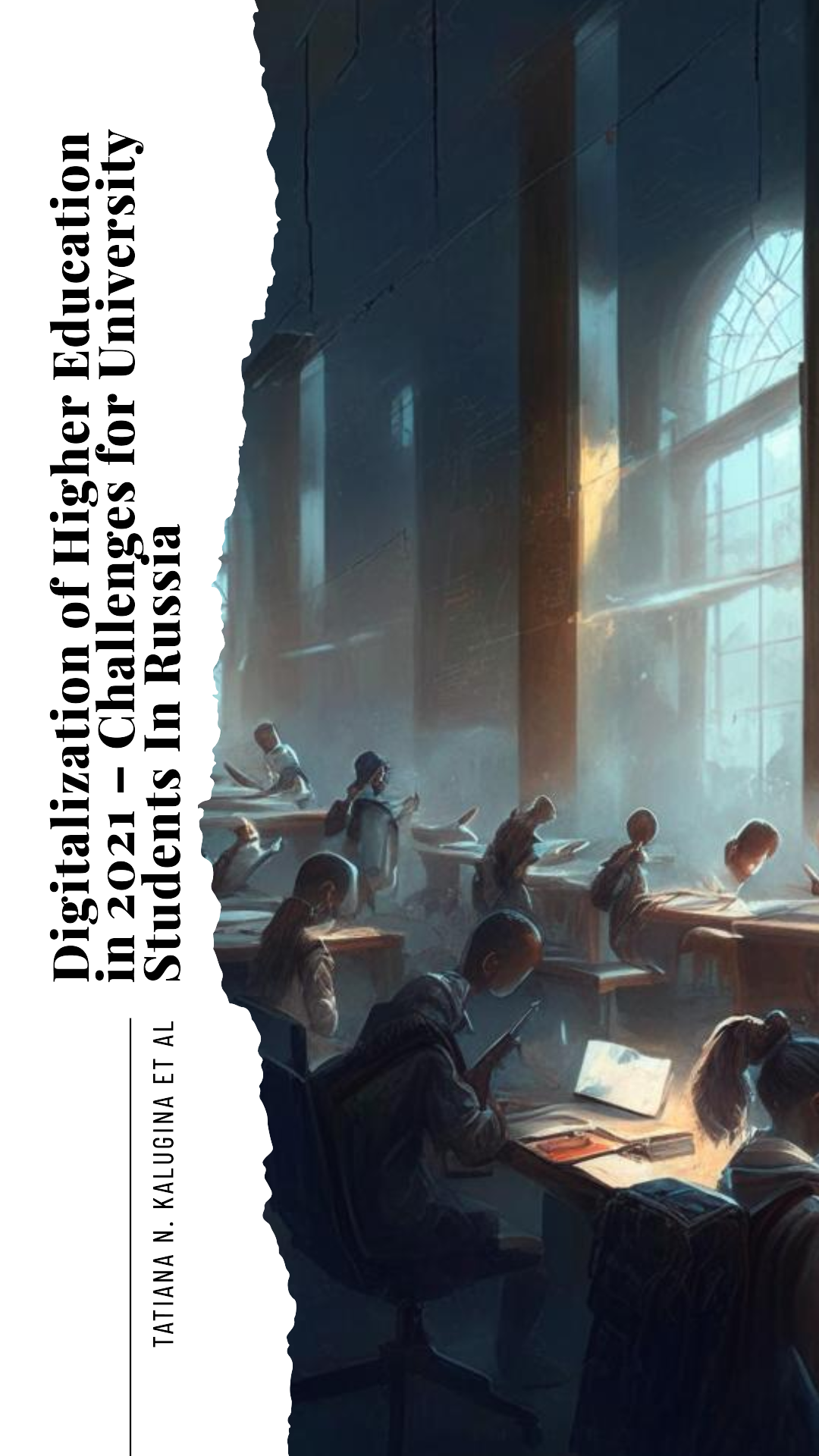Abstract
Digital educational platforms emerged as an anticipated technological response to the need for the modernization of higher education. The digitalization of education was promoted at the state level as a strategy and an instrument to improve the quality and competitiveness of education. In 2020, the coronavirus pandemic accelerated the transition from the classroom to online-only, revealing the lack of purposeful online teaching methods, and insufficient digital competence among teachers.
The authors analyzed publications by foreign and Russian researchers to highlight the common problems of higher education digitalization, including datafication, limited capabilities of digital educational platforms, and the changing role of the teachers in e-learning. The article focuses on students’ attitudes towards online education, and their voluntary or unwilling involvement in the digital educational environment, considering synchronous, asynchronous, and blended forms of learning before and during the pandemic.
The achieved results suggest that such factors as the novelty and accessibility of online courses at Western universities initially served as a factor of attraction the students, inviting them to diversify their studies in their own creative way. However, increased stress and workload, various technical problems, tough teachers’ control on the one hand, and poor feedback, on the other, weakened the popularity of the digital educational environment. When asked to compare the pros and cons of online education, most students spoke in favour of maintaining the blended education format, as it allows for reducing the workload and – to some extent – enables the students to take control of their education trajectories.
This work is intended for educators and researchers interested in the challenges caused by integrating digital technologies into traditional forms of education.
References
A Digital agenda for Europe. (2010). European Commission homepage. https://eur-lex.europa.eu/LexUriServ/LexUriServ.do?uri=COM:2010:0245:FIN:EN:PDF
Abe, J. A. A. (2020). Big five, linguistic styles, and successful online learning. The Internet and Higher Education, 45, 100724. https://doi.org/10.1016/j.iheduc.2019.100724
Barnett, R. (2014). Conditions of flexibility: Securing more responsive higher education system (Vol. 10). Higher Education Academy.
Bronkhorst, L. H., & Akkerman, S. F. (2016). At the boundary of school: Continuity and discontinuity in learning across contexts. Educational Research Review, 19, 18–35. https://doi.org/10.1016/j.edurev.2016.04.001
Bušelić, M. (2017). Distance Learning – concepts and contributions. Oeconomica Jadertina, 2(1), 23–34. https://doi.org/10.15291/oec.209
Dahlstrom, E., Brooks, D. C., & Bichsel, J. (2014). The Current Ecosystem of Learning Management Systems in Higher Education: Student, Faculty, and IT Perspectives. EDUCAUSE. https://library.educause.edu/-/media/files/library/2014/9/ers1414-pdf.pdf
Decree of the Government of the Russian Federation of 16.11.2020 N 1836 “On the State Information System “Modern Digital Educational Environment”. (2020). Garant. https://base.garant.ru/74922854/ (In Russian).
Decuypere, M., & Landri, P. (2021). Governing by visual shapes: University rankings, digital education platforms and cosmologies of higher education. Critical Studies in Education, 62(1), 17–33. https://doi.org/10.1080/17508487.2020.1720760
Decuypere, M., Grimaldi, E., & Landri, P. (2021). Introduction: Critical studies of digital education platforms. Critical Studies in Education, 62(1), 1–16. https://doi.org/10.1080/17508487.2020.1866050
Erstad, O., & Silseth, K. (2019). Futuremaking and digital engagement: From everyday interests to educational trajectories. Mind, Culture, and Activity, 26(4), 309–322. https://doi.org/10.1080/10749039.2019.1646290
Herloa, D. (2015). Improving Efficiency of Learning in Education Master Programs, by Blended Learning. Procedia - Social and Behavioral Sciences, 191, 1304–1309. https://doi.org/10.1016/j.sbspro.2015.04.326
Hoi, S. C. H., Sahoo, D., Lu, J., & Zhao, P. (2021). Online learning: A comprehensive survey. Neurocomputing, 459, 249–289. https://doi.org/10.1016/j.neucom.2021.04.112
Knox, J., Williamson, B., & Bayne, S. (2020). Machine behaviourism: Future visions of ‘learnification’ and ‘datafication’ across humans and digital technologies. Learning, Media and Technology, 45(1), 31–45. https://doi.org/10.1080/17439884.2019.1623251
Kononov, A. N., & Komissarova, A. S. (2021). Qualitative analysis of attitudes to distance learning in the context of the COVID-19 pandemic. Vestnik of Kostroma State University. Series: Pedagogy. Psychology. Sociokinetics, 27(1), 17–23. https://doi.org/10.34216/2073-1426-2021-27-1-17-23 (In Russian).
Lindberg, S. (2020). Politics of digital learning—Thinking education with Bernard Stiegler. Educational Philosophy and Theory, 52(4), 384–396. https://doi.org/10.1080/00131857.2019.1586531
Lindfors, M., Pettersson, F., & Olofsson, A. D. (2021). Conditions for professional digital competence: The teacher educators’ view. Education Inquiry, 12(4), 390–409. https://doi.org/10.1080/20004508.2021.1890936
Lysova, I. I., Vitohina, O. A., & Volkova, O. V. (2020). Digital competence as arequirement for development of innovative educational environment at university. Issues in Journalism, Education, Linguistics, 39(3), 408–418. https://doi.org/10.18413/2712-7451-2020-39-3-408-418 (In Russian).
Pezzino, M. (2018). Online assessment, adaptive feedback and the importance of visual learning for students. The advantages, with a few caveats, of using MapleTA. International Review of Economics Education, 28, 11–28. https://doi.org/10.1016/j.iree.2018.03.002
Rasheed, R. A., Kamsin, A., & Abdullah, N. A. (2020). Challenges in the online component of blended learning: A systematic review. Computers & Education, 144, 103701. https://doi.org/10.1016/j.compedu.2019.103701
Recommendation of the European Parliament and of the Council of 18 December 2006 on key competences for lifelong learning. (2006). http://data.europa.eu/eli/reco/2006/962/oj/eng
Sage, M., & Sele, P. (2015). Reflective Journaling as a Flipped Classroom Technique to Increase Reading and Participation with Social Work Students. Journal of Social Work Education, 51(4), 668–681. https://doi.org/10.1080/10437797.2015.1076274
Smith, K., & Hill, J. (2019). Defining the nature of blended learning through its depiction in current research. Higher Education Research & Development, 38(2), 383–397. https://doi.org/10.1080/07294360.2018.1517732
Solovyova, S. V., & Konev, V. A. (2021). Social Distancing and the Deficit of Presence (Philosophical Reflection of the Covid-19 Pandemic). Concept: philosophy, religion, culture, 5(2), 29–43. https://doi.org/10.24833/2541-8831-2021-2-18-29-43 (In Russian).
Startling digital divides in distance learning emerge. (2023). UNESCO. https://www.unesco.org/en/articles/startling-digital-divides-distance-learning-emerge
The impact of COVID-19 on higher education around the world. (2020). International Association of Universities Homepage. https://www.iau-aiu.net/IMG/pdf/iau_covid19_and_he_survey_report_final_may_2020.pdf
Vanslambrouck, S., Zhu, C., Lombaerts, K., Philipsen, B., & Tondeur, J. (2018). Students’ motivation and subjective task value of participating in online and blended learning environments. The Internet and Higher Education, 36, 33–40. https://doi.org/10.1016/j.iheduc.2017.09.002
Wanner, T., & Palmer, E. (2015). Personalising learning: Exploring student and teacher perceptions about flexible learning and assessment in a flipped university course. Computers & Education, 88, 354–369. https://doi.org/10.1016/j.compedu.2015.07.008
Williamson, B. (2021). Making markets through digital platforms: Pearson, edu-business, and the (e)valuation of higher education. Critical Studies in Education, 62(1), 50–66. https://doi.org/10.1080/17508487.2020.1737556

This work is licensed under a Creative Commons Attribution 4.0 International License.

